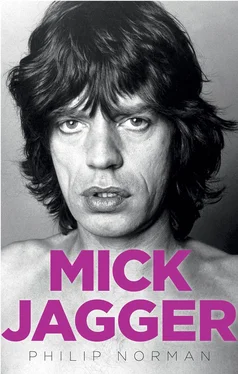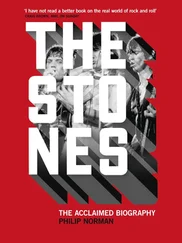The gig might be at a cinema, a theatre, a Victorian town hall or corn exchange; one was a kiddies’ party whose guests, expecting more conventional entertainment, pelted them with cream buns. The Britain of 1963 had no fast-food outlets but fish-and-chip shops and Wimpy hamburger bars: but for these and Chinese and Indian restaurants, a certain ever-hungry mouth would have seen little action the livelong night. Local promoters who had booked the Stones sight unseen reacted with varying degrees of incredulity and horror at what turned up. After one show to a near-empty hall in the industrial back-of-beyond, the promoter docked them their entire fee for being ‘too noisy’, then saw them off the premises with the help of a ferocious Alsatian guard dog and wearing boxing gloves for good measure.
At the beginning, Mick and Keith still saw themselves as missionaries, preaching R&B to the unenlightened as they had dedicated themselves to doing back in Dartford. They discovered, however, that dozens of other bands around the circuit, especially northern ones, had undergone the same conversion and felt the same proselytising zeal. The difference was that, while the others played only Chuck Berry’s ‘Roll Over Beethoven’, the Stones knew Berry’s entire œuvre . Mick observed, too, that northern bands in particular felt a common affinity with old-fashioned music-hall comedy and, following the Beatles’ example, ‘turned into vaudeville entertainers onstage’. That was a trap he was determined never to fall into. Graham Nash from the Hollies, the north’s second most successful band, couldn’t help admiring these unsmiling southerners’ refusal to conform to type: ‘They didn’t seem to be copying anybody – and they didn’t give a fuck.’
The word that increasingly went ahead of them, based solely on the length of their hair, was dirty . Nothing could have been further from the truth. Mick was utterly fastidious about personal cleanliness, and one of those fortunate people who do not show dirt; Brian washed his eye-obscuring blond helmet so religiously each day that the others nicknamed him ‘Mister Shampoo’; Bill Wyman as a small boy used to do his mother’s housework for her; the Hornsey Art School student Gillian Wilson, who had a fling with Charlie Watts, remembers his underwear being cleaner than hers. They had now given up any semblance of a stage uniform and went onstage in the same Carnaby motley in which they’d arrived at the theatre. Though all of them were clothes-mad and cutting-edge fashionable, this revolutionary break with tradition added a reek of BO to the implied dandruff and head lice. Their manager took every opportunity to circulate the double slander, adding a third for good measure: ‘They don’t wash much and they aren’t all that keen on clothes. They don’t play nice-mannered music, but raw and masculine. People keep asking me if they’re morons . . .’
For Oldham had finally seen with the clarity of a divine vision where to take them – and, in particular, Mick. As the Beatles progressively won over the older generation and the establishment, and were unconditionally adulated by Fleet Street, many of their original young fans were feeling a sense of letdown. Where was the excitement – the rebellion – in liking the same band your parents or even grandparents did? He would therefore turn the Rolling Stones into anti-Beatles; the scowling flip side of the coin Brian Epstein was minting like a modern Midas. It was a double paradox, since the angelic Fab Four had a decidedly sleazy past in Hamburg’s red-light district, whereas the bad boys Oldham now proposed to create were utterly blameless, none more than their vocalist.
Indeed, the Jagger image at this point could well have gone in the very opposite direction. Early press stories on the Stones still gave his Christian name as Mike, resurrecting that bourgeois aura of Sunday-morning pubs, sports cars and driving gloves. There was also PR mileage to be extracted from his intellectual achievements. Until now, only one British pop star, Mike Sarne, had experienced further education (coincidentally also at London University).
As Tony Calder remembers, Mick was profoundly uneasy over the master plan that Oldham outlined to him – and not just for its gross misrepresentation of his character. ‘He said he’d bide his time and see if it worked out or not. But there were so many times when he’d turn up at the office, Andrew would call for two cups of tea and shut the door. He’d be in there alone with Mick for a couple of hours doing one thing – building up his confidence. Self-esteem? He didn’t have any. He was a wimp.’
A famous colour clip of the Stones onstage at the ABC cinema, Hull, filmed by one of Britain’s last surviving cinema newsreels, shows them playing ‘Around and Around’ for the umpteenth time, against a barrage of maniacal screams. They seem to be doing remarkably little to encourage this uproar: Bill playing bass in his odd vertical style, Keith lost in his chords, Brian almost street-mime motionless, with an odd new electric guitar shaped like an Elizabethan lute. Mick, in his familiar matelot-striped shirt – and almost glowing with cleanliness – seems least involved of all. Even in this paean to the liberating joy of music, his well-moistened lips barely stir, giving the words an edge of sarcasm (‘Rose outa my seat . . . I just had to daynce . . .’) reflected in his veiled eyes and occasional flamenco-style hand clap. In the guitar solo he does a stiff-legged dance with head thrust forward and posterior stuck out, ironically rather like the vaudeville ‘eccentric’ style, then still preserved by such veterans as Max Wall and Nat Jackley.
Since the onset of Beatlemania, young girls at pop shows had screamed dementedly whatever acts were served up to them, male or female, but until now had always stayed in their seats. With Rolling Stones concerts came a new development: they attacked the stage. These were the days when security at British pop concerts consisted of theatre staff checking tickets at the door, and the only barrier between performers and audience as a rule was an empty orchestra pit. During a performance in Lowestoft, Suffolk, on 6 September, half a dozen demented girls began trying to tear off the band’s clothes and grabbing for souvenirs. (Bill later discovered a valuable ring had been wrenched off his finger.) Mick’s athleticism proved an unexpected asset: as one invader rushed at him, he swept her up in a fireman’s lift, carried her offstage, then returned to continue the number.
The next day brought a 200-mile drive from coastal Suffolk to Aberystwyth, north Wales, then another of 150 miles south to Birmingham for a second appearance on Thank Your Lucky Stars . Also on the bill was Craig Douglas, who had panned Mick’s ‘Come On’ vocal in Melody Maker . Before becoming a pop singer, Douglas had been a milkman on the Isle of Wight; in revenge for his hostile review – and with unendearing social snobbery – the Stones dumped a cluster of empty milk bottles outside his dressing room door.
On 15 September they were opening in a show called The Great Pop Prom at London’s Royal Albert Hall, with the Beatles as top of the bill. Five months earlier, Mick, Keith and Brian had walked into the Albert Hall anonymously, disguised as Beatle roadies; now the Chelsea boot was well and truly on the other foot. The Stones’ support-band spot unleashed such pandemonium that John Lennon and Paul McCartney were seen peeping through the curtains, nervous of being upstaged for the first time since their Hamburg days. Boyfriend magazine was unequivocal in naming the night’s real stars: ‘Just one shake of [that] overgrown hair is enough to make every girl in the audience scream with tingling excitement.’
Читать дальше












